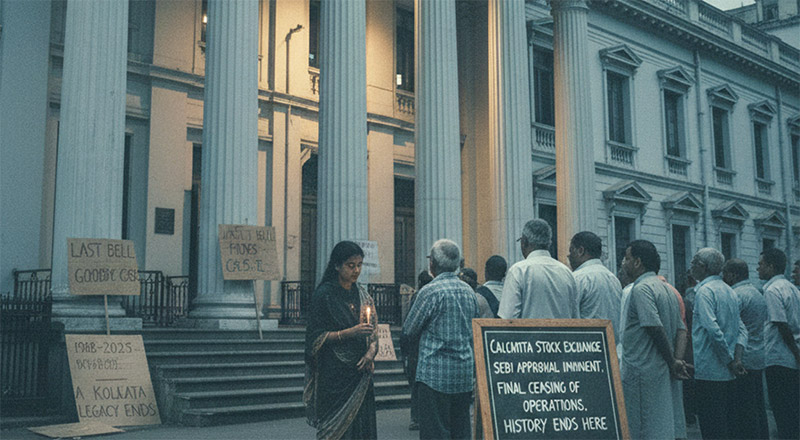Blitz Bureau
NEW DELHI: For Kolkata’s century-old Calcutta Stock Exchange (CSE), once a proud symbol of the city’s financial heritage, Diwali and Kali Puja this year was probably its last as a functioning exchange, according to a report by Moneylife Digital.
After over a decade of suspended trading, regulatory hurdles and courtroom battles, the exchange is now reportedly on the brink of a voluntary exit from its 117-year-old stock exchange licence, marking the end of one of India’s oldest market institutions.
Founded in 1908 on China Bazar Street, CSE was India’s second recognised bourse after the Bombay Stock Exchange (BSE). It once rivalled the BSE in trade volume and investor activity, representing eastern India’s economic aspirations.
However, the Rs120-crore Ketan Parekh-linked scam triggered a major payment crisis at the exchange, leading to large-scale broker defaults and marking the beginning of the exchange’s long decline from its once-proud position as Kolkata’s financial symbol. Add to this, decades of regulatory non-compliance, scandals and shrinking relevance in a technology-driven market eventually brought the operations of CSE to a halt.
Trading on CSE was officially suspended in April 2013 when market regulator Securities and Exchange Board of India (Sebi) barred the exchange for failing to meet core regulatory requirements, including maintaining the mandatory turnover threshold and establishing a separate clearing corporation. Since then, CSE’s only function has been to allow its members to trade through tie-ups with the National Stock Exchange (NSE).
Efforts to restart operations continued for years, as the exchange challenged Sebi’s orders before the Calcutta High Court and the Supreme Court. But in December 2024, the board of CSE finally decided to withdraw its pending legal cases and initiate a voluntary exit process.
The formal application for exit was submitted to Sebi on 18 February 2025, after receiving shareholder approval through an extraordinary general meeting (EGM) held on 25 April 2025, says a report from PTI .
CSE’s chairman and public interest director Deepankar Bose reportedly confirmed that the shareholders had approved the exchange’s exit from the stock exchange business. “Approval has been obtained from the shareholders relating to the exit of the stock exchange business. Accordingly, CSE submitted the exit application to Sebi, which has, in turn, appointed a valuation agency for undertaking the valuation of the stock exchange,” Mr Bose was quoted as saying in a report from Times of India (ToI).
However, in a statement, CSE says Mr Bose has not spoken to any news agency nor any journalist. “We categorically state that Mr Bose has not talked with any journalist in the matter of CSE Diwali and sale of land of CSE.”
The regulator has appointed Rajvanshi & Associates to carry out the valuation — an essential step before granting the final approval for exit, says a person in the know of matters.
Once the Sebi nod is secured, CSE will transition into a holding company, while its fully owned subsidiary, CSE Capital Markets Pvt Ltd (CCMPL), will continue its broking operations as a member of NSE and BSE.
Sebi has also cleared the proposed sale of CSE’s three-acre property on the EM Bypass in Kolkata to the Srijan Group for Rs 253 crore, which will be executed after Sebi’s final clearance, media reports say. The sale and the exit process are expected to provide financial stability to the exchange in its new form as a holding entity.
The downfall of CSE was gradual but inevitable. Its decline can be traced back to the early 2000s when the exchange struggled to adapt to the electronic trading systems adopted by its larger counterparts — the BSE and the NSE. The situation worsened after the Rs120-crore Ketan Parekh scam in 2001, which led to massive broker defaults and a loss of investor confidence. The ensuing payment crisis shattered trust in the exchange, and volumes never recovered.
Sebi’s enforcement of its 2012 exit policy for underperforming exchanges further constrained CSE’s ability to survive. Under this policy, exchanges that failed to maintain an annual turnover of Rs 1,000 crore and did not establish or tie up with a clearing corporation were subject to compulsory exit.
While the Calcutta High Court allowed CSE time to comply, Sebi maintained that the bourse had not conducted meaningful business for over a decade and had become ‘a hub for manipulation’.
Despite temporary judicial reliefs, financial pressures mounted. The exchange’s trading membership dwindled, and with competition from the NSE’s high-speed platforms, the CSE’s role in India’s capital market ecosystem faded into near irrelevance.
In anticipation of Sebi’s approval for its voluntary exit, the exchange introduced a voluntary retirement scheme (VRS) for all employees this year. The plan involved a one-time payout of Rs 20.95 crore, expected to save about Rs 10 crore annually. All employees opted for the scheme, though some were retained on short-term contracts to handle compliance matters until the exit process concludes.
In his FY24-25 annual report, chairman Bose noted that CSE ‘has played an important role in India’s capital markets’ since its inception. The report highlighted that the exchange continues to have 1,749 listed companies and around 650 registered members, though no active trading occurs. It also disclosed that Mr Bose received Rs 5.9 lakh in sitting fees during FY24-25.
For many in Kolkata’s financial community, CSE’s closure symbolises the end of a glorious chapter in the city’s economic history. Established during British rule, the exchange once stood as the commercial heart of eastern India, hosting generations of traders, brokers, and investors who shaped the region’s financial character.
While the CSE has officially denied reports of an immediate closure, stating that it has not yet received Sebi’s approval to wind down, its fate appears sealed. Once the regulator grants its nod, the 117-year-old bourse will formally exit the stage, leaving behind only memories of ticker tapes, shouting brokers, and the rhythmic clang of the trading bell that once echoed through Kolkata’s financial district.



